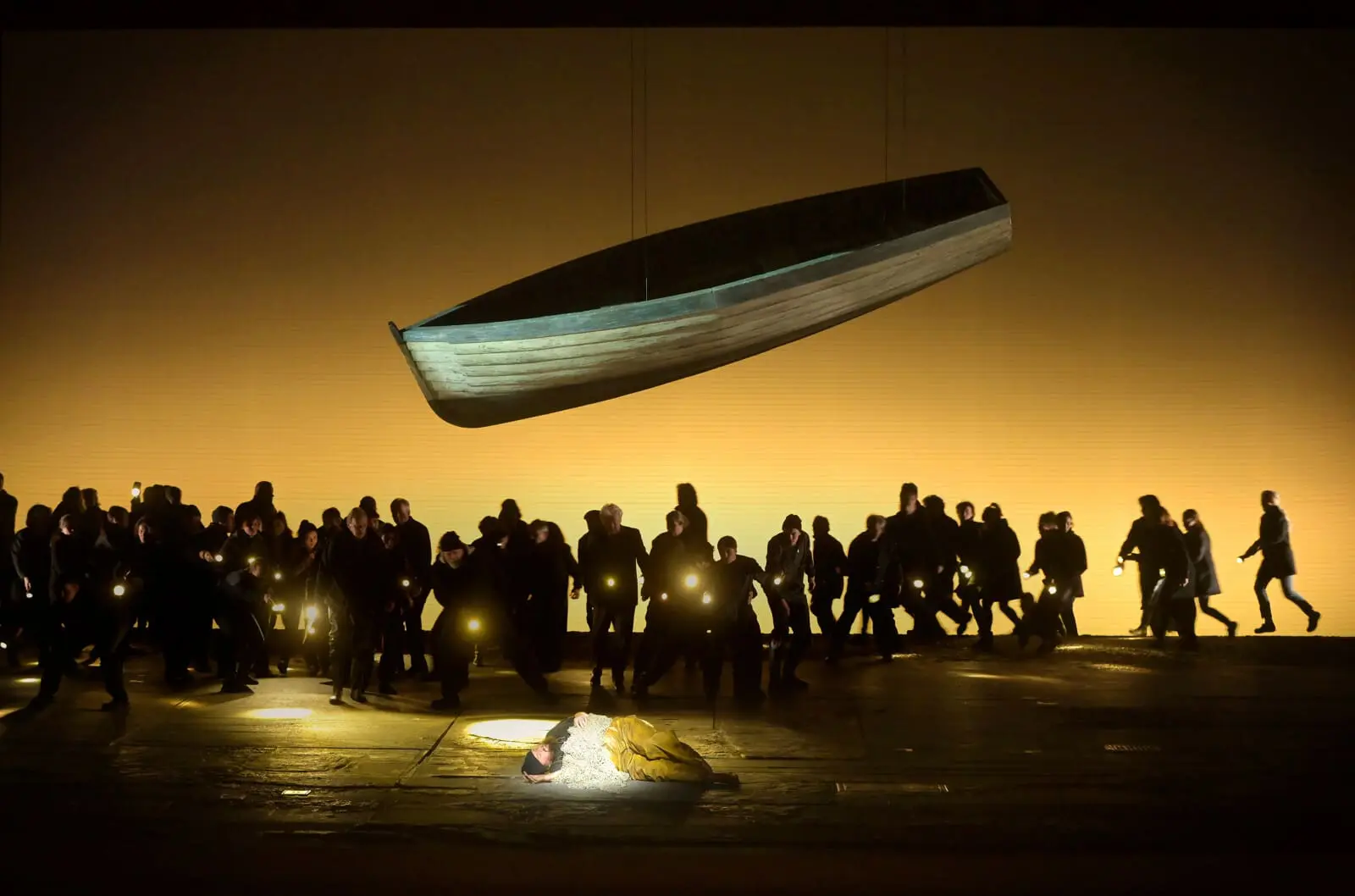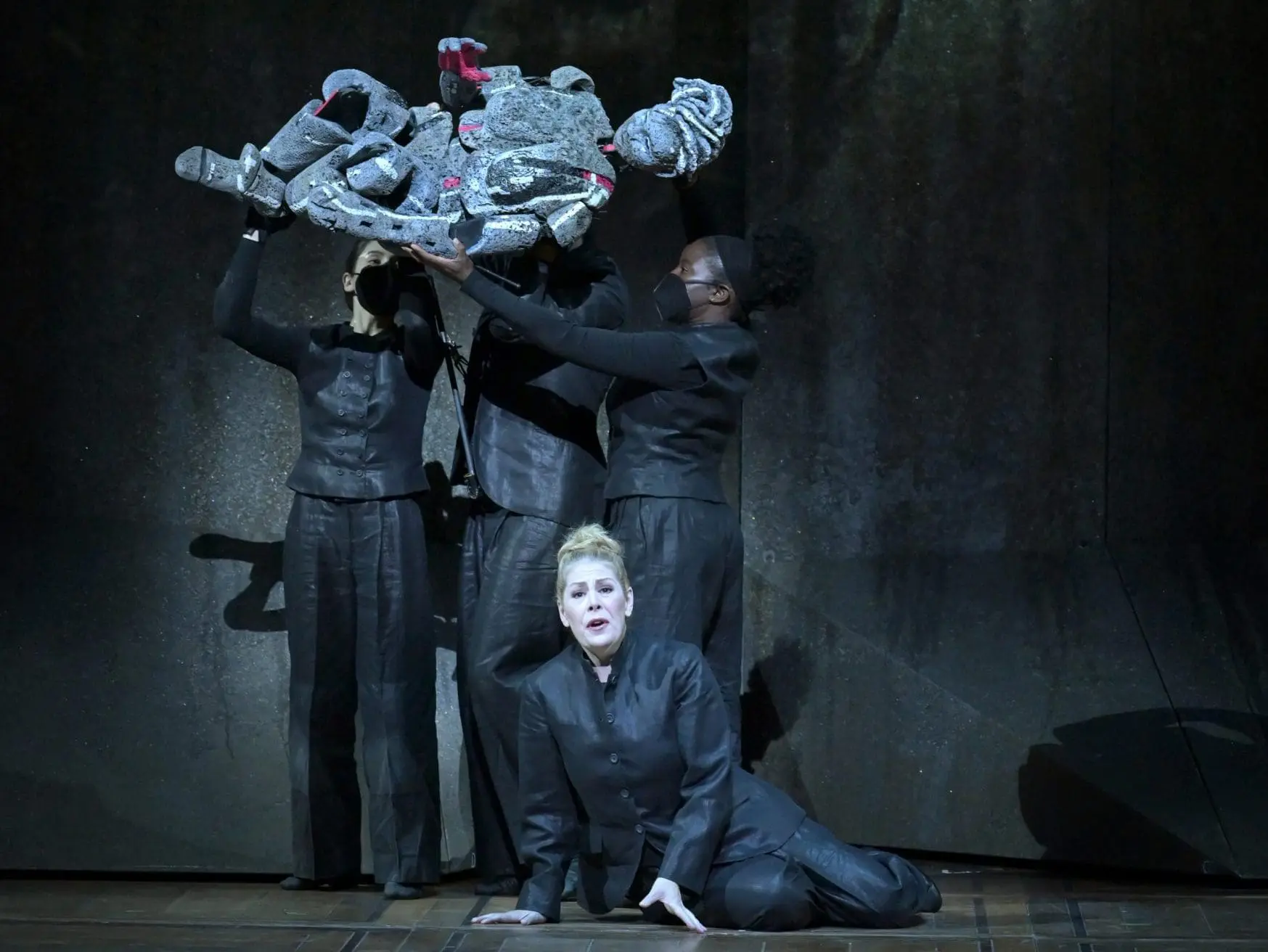Benjamin Britten‘s Peter Grimes, directed by Deborah Warner at the Paris Opera this season, was perhaps one of the best opera productions of the last decade. Contributing to this was the phenomenal alignment of major stars from Warner to the Canadian stage designer Michael Levine, conductor Alexander Soddy, and English tenor Allan Clayton—now considered the quintessential Peter Grimes. Though many great tenors have left their mark on this role, most recently Jonas Kaufmann in Vienna, few have at once the richness and power in the lower register and the light lyricism of a Mozart tenor in the way Clayton does. The magnificent elegy “Now the Great Bear and Pleiades,” sung with his back to the audience, face against the door of the Boar’s Inn, where the whole village has taken refuge to escape from the storm, will remain an unforgettable moment.
From the beginning, the visual purity of Levine’s sets establishes a mood of austerity; a white wall at the back and clusters of spotlights on the sides delimit a bare space, modulable with wooden panels or boat hulks. The lighting by Peter Mumford is key to the unsettling atmosphere, using effects reminiscent of Robert Wilson: a horizontal line of reverberating light quivering on the horizon. The first tableau is a wooden fishing boat suspended in the void, a man on the ground, entangled in a mound of fishing nets. The opening scene is not in a courtroom but inside Grimes’s nightmare. An aerialist hovers overhead, a revenant of Grimes’s first apprentice whose tragic death eats away at the fisherman’s mind. Prostrate on the ground, with a crowd of angry, flashlight-brandishing vigilantes surrounding him—who is Peter Grimes, the loner, and misfit, whose second apprentice has mysteriously died at sea just like the one before him? For Warner, Grimes is a beast hunted by the hysterical mass, and her directing style allows the actor’s attributes to fusion with those of the character to the point of making every move and gesture believable. Clayton becomes the “Great Bear” with his massive physique and swaying stride; his fate is heartbreaking to watch.
Warner has been delving into Britten’s tumultuous works for many years, a memorable Billy Budd at Covent Garden, and the Teatro Real in Madrid—but not at the Paris Opera, and many years ago, a hauntingly beautiful Turn of the Screw at the MC93 in Bobigny, a suburb of the capital. Fortunately, this time the Paris Opera gave Deborah Warner a chance on center stage, the first engagement for the famous English director with the company.
Warner treats the chorus like a mad mob hunting Grimes, but she also works with them individually, and psychologically— each one has a role and a character. The chorus is extremely important to the piece and excellently prepared by the company’s new chorus master Ching-Lien Wu. The crowd scenes are terrific and terrifying; a wild energy builds up, and criminal elements emerge; violent young men cobble together a mannequin, the effigy of Grimes, hang it on a pole, and smash it against the harbor wall. As the delirium sets in, we see ordinary folks turn into a lynch mob and head towards Grimes’ cabin on the cliff.
The protagonist’s only friend and betrothed, Ellen Orford, is marvelously portrayed by Swedish soprano Maria Bengtsson, her delicate timbre full of compassion and her “Embroidery Aria” exquisite. But she is also capable of power and vehemence when confronting Grimes or the villagers.
Grimes’s other ally, Captain Balstrode, beautifully sung by Simon Keenlyside, is the voice of reason amidst the general hysteria—and the only individual the crowd respects.
Catherine Wyn-Rogers is excellent as Auntie, a formidable figure, she nevertheless brings humanity and warmth to her role as madam and innkeeper of the poverty-stricken borough. Her “nieces,” sopranos Anna-Sophie Neher, and Ilanah Lobel-Torres, lend a note of comedy to the darkness, decked out in sequined shorts and selling their charms while making fun of their galumphing clients. Both have stunning voices: Neher’s full of crystalline light and shine, Lobel-Torres with darker tones. Their timbres blend beautifully in the Act II quartet—a rare moment of grace with echoes of Strauss’s Der Rosenkavalier.
Rosie Aldridge‘s portrayal of the laudanum-addicted widow Sedley turned detective who shadows Grimes to his death is excellent, as are all the secondary characters—John Graham-Hall as a drunken Methodist preacher, bass Clive Bayley as judge Swallow, Stephen Richardson‘s Hobson, James Gilchrist‘s repugnant Reverend Horace Adams, and Jacques Imbrailo‘s high-voltage Ned Keene complete this dark fresco.
In the pit, Alexander Soddy, also making his Paris Opera debut, revels in Britten’s splendid symphonic writing, exploiting the Paris Opera Orchestra‘s power and tone palette to the fullest.
Warner never pronounces a verdict on Grimes but explores the poet beneath the shaggy exterior, the ungainly outsider at odds with society. Finally, the voices of the sublime women’s chorus, like sirens, entice the Great Bear towards the open ocean and inevitable death.
Related Content ⬇
Opera Canada depends on the generous contributions of its supporters to bring readers outstanding, in-depth coverage of opera in Canada and beyond. Please consider subscribing or donating today.
OPÉRA NATIONAL DE PARIS
JAN 23 to FEB 24 2023
BRITTEN PETER GRIMES
CAST AND CREATIVE TEAMS
Conductor Joana Mallwitz
Stage director Deborah Warner
Chorus master Chin-Lien Wu
Set designer Michael Levine
Lighting designer Peter Mumford
Video designer Will Duke
Choreographer Kim Brandstrup
Costume designer Luis F. Carvalho
Peter Grimes Allan Clayton
Ellen Orford Maria Bengtsson
Auntie Catherine Wyn-Rogers
Niece I Anna-Sophie Neher
Niece II Ilanah Lobel-Torres
Balstrode Simon Keenlyside
Mrs. (Nabob) Sedley Rosie Aldridge
Swallow Clive Bayley
Ned Keene Jacques Imbrailo
Bob Boles John Graham-Hall
Rev. Horace Adams James Gilchrist
Hobson Stephen Richardson
Orchestre de l´Opéra national de Paris
Choeurs de l´Opéra national de Paris














